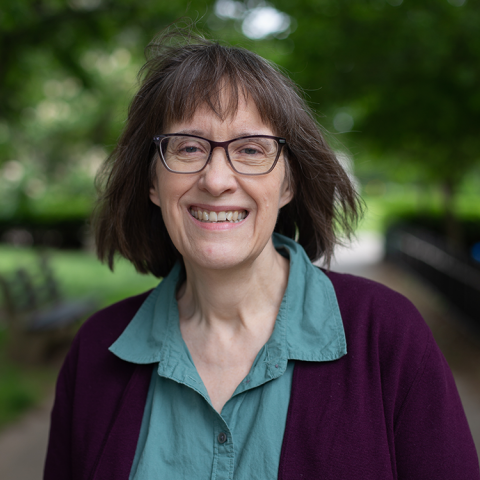
Julie has been a member of the Sojourners magazine editorial staff since 1990. For the last several years she has edited the award-winning Culture Watch section of the magazine. In her time at Sojourners she has written about a wide variety of political and cultural topics, from the abortion debate to the working class blues. She has coordinated in-depth coverage of Flannery O’Connor, campaign finance reform, Howard Thurman, the labor movement, and much more.
She studied English literature at Ohio State University and has an M.T.S. (focused on language and narrative theology) from Boston University and an M.F.A. in creative nonfiction from George Mason University.
Julie grew up on a farm in the northwest corner of Ohio. She has been fascinated by the power of religious expression in and through culture since she can remember. Obsessively listening to her older sister’s copy of the Jesus Christ Superstar cast recording when she was 10 was an especially crystallizing experience. In addition, Julie’s mother often argued about doctrine and the Bible and took her at least weekly to the public library, both of which were useful background for Julie’s current work.
She lives in the Columbia Heights neighborhood of Washington, D.C. and is a member of St. Margaret’s Episcopal Church (where she had an unlikely four-year reign as rummage sale czarina). Her personal interests overlap nicely with her professional ones: Music, books, reading entertainment, culture, and religion writing, art, architecture, TV, films, and knowing more celebrity gossip than is probably wise or healthy. To make up for all that screen time, she tries to grow things, hike occasionally, and wonder often at the night sky.
Some Sojourners articles by Julie Polter:
Replacing Songs with Silence
Censorship, banning, blacklists: What’s lost when governments stifle musical expression?
Extreme Community
A glimpse of grace and abundance from - of all things - reality TV.
The Cold Reaches of Heaven
Nobel Prize-winning physicist Bill Phillips talks about his faith.
Just Stop It
Daring to believe in a life without logos. An interview with journalist Naomi Klein.
Women and Children First
Developing a common agenda to make abortion rare.
Obliged to See God (on Flannery O’Connor)
Posts By This Author
Called to Stand with Workers
This morning's Washington Post said it is a "workers' market." A booming U.S.
Aiming Above the Bottom Line
The Big One is a biting, funny, and sometimes odd combination of road film, populist rant, stand-up comedy, and the away-from-home video your quirky, know-it-all uncle might make if someone gave him the equipment and enough frequent flyer miles.
The premise is simple enough: Filmmaker Michael Moore (of Roger and Me fame) takes a video crew along on the promotional tour for his book Downsize This! (Crown Publishing, 1996). See Moore eat bad fast food. (Yuck.) See Moore commiserate with laid-off workers. (Poignant.) See Moore sing Bob Dylan and encounter an ex-convict who used to take reservations for TWA from in prison. (Scary!) See Moore visit various corporate headquarters in search of a CEO who will talk on camera about exactly why record profits seem to lead to employee lay-offs. (Can you say "No comment"?)
While Moore is not troubled by giving himself lots of camera time, the important thing is that he puts his ego (and money, and skill) in the service of what he believes. With profits from Roger and Me (the all-time highest grossing non-concert documentary), he set up the Center for Alternative Media, a foundation that has given funding to more than 40 independent filmmakers as well as social action and service groups. Miramax, distributor of The Big One, is giving half of all profits from this film to groups and scholarship funds that Moore supports in Flint, Michigan.
Praying for Power
Some Christians have tried for a "school prayer" amendment to the Constitution ever since the early 1960s, when the Supreme Court banned state-sponsored religious activity in public schools. On June 4, the latest attempt—called the "Religious Freedom Amendment" by its sponsor, U.S. Rep. Ernest Istook (R-Okla.)—was the first such measure to reach a House floor vote in 27 years. Although it failed to get the two-thirds majority required for passage, the measure and the largely partisan vote (a majority of Republicans favored the measure, a majority of Democrats opposed) holds continuing significance for the U.S. political scene.
The Istook amendment is a case study in the muddy water that gets stirred up when true believers begin playing partisan politics. According to a New York Times report, House Speaker Newt Gingrich met with Christian Coalition Chair Pat Robertson soon after the amendment passed the Judiciary Committee. Gingrich renewed a 1994 pledge to religious conservatives to bring a school prayer amendment to a House vote. Besides the Istook amendment, Gingrich also agreed to push legislation eliminating funding for the National Endowment for the Arts and approving voucher-style tax deferrals for private religious school tuition, all before the November elections.
The Christian Coalition spent more than half a million dollars on behalf of the amendment, including radio ads in the districts of targeted members of Congress. It seems likely that votes against the Istook amendment by members of Congress up for re-election will be used against them by both secular conservatives and the Religious Right during the campaign season. Which means that a matter of faith and conscience will have been reduced to just another wedge issue in the struggle for political dominance.
Resources for Study and Action
As part of a worldwide boycott of all old-growth redwood products, the World Stewardship Institute is urging faith communities to ban the use of redwood in the construction of worship facilities.
From the Inside Out
A Place Apart
Good News and a Living Wage
Why We Must Honor the Worker, Not Just the Work

Photo via Halfpoint / Shutterstock
Work that is a trap, work that demeans, work that slaughters, work that destroys souls or the world—this isn't divinely ordained, nor divinely blessed.
Finding Another Way
A pro-choice activist describes what it's like when a major pro-life protest occurs in her city: "I'm the one who calls in the army [of volunteer clinic escorts]....It's like a war. I don't like it. I'm tired. I want to see if there's another way to deal with this issue."
So on a brilliant spring day she joined 100 other people in Madison, Wisconsin, in the first national conference of the Common Ground Network for Life and Choice. For four days pro-choice activists, clergy, doctors, and women's clinic directors could be found with pro-life activists, clergy, lawyers, and crisis pregnancy center volunteers in workshops, strategy sessions on teen-age pregnancy and adoption, and—perhaps the biggest surprise—friendly conversation.
These people didn't ignore their very real differences on the core issue of abortion, but they also didn't allow those differences to distract them from seeking the "common ground" that exists even among adversaries.
The Common Ground Network came together in 1993 out of dialogue and joint action between pro-choice and pro-life supporters in Buffalo, St. Louis, and elsewhere. The network links such "common ground" groups around the country, providing resources, training, and facilitators.
Activists from both "sides" of the abortion issue sit down together for extended discussion under specified ground rules: respectful speech and behavior; a desire to understand; a pledge to refrain from attempts to convert and convince; and confidentiality. Discussion moves from issues directly related to abortion (What's the life experience that's led you to the position that you've taken?) to related topics suggested by group members (What are your beliefs about birth control? How do we best teach our children about sexuality?). A goal is to identify areas of agreement and possible cooperative work. Examples have included promoting adoption and developing a mutual "code of conduct" for public hearings concerning abortion.
Outrage Over the Abortion Veto
When President Clinton vetoed a bill this spring that would have banned a specific method of late-term abortion, many people were outraged.
